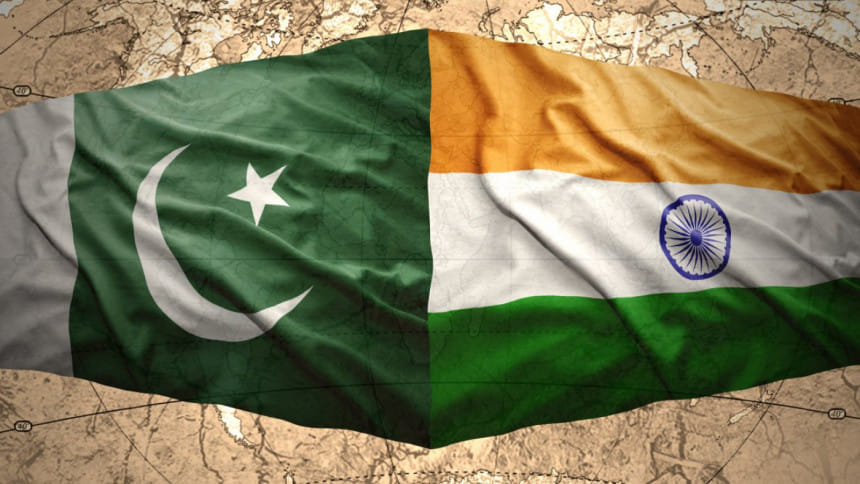Victim of new Cold War in South Asia

First it was an Indian government official belonging to the "National Institution for Transforming India" berating SAARC mercilessly and calling it an association for regional confrontation, and advocating its dissolution and replacement by BBIN and BCIM, and now it is a former Indian envoy to Bangladesh who thinks Bangladesh should forget about SAARC and concentrate more on other sub-regional arrangements for development. The audience on both the occasions, by the way, was predominantly Bangladeshi but the venues were different. Both the comments do great injustice to the regional organisation.
That the annual summit of the regional leaders has been postponed, notwithstanding the compelling reasons for it, is a dampener for those who would like to see the regional body not only survive but do so with a flourish and play a more effective role in enhancing cooperation and trust among the eight nations of the region. And God knows that there is deficit of both in the region.
The issue of the relevance of SAARC or the lack of it has again become a talking point after the cancellation of the 19th Summit that was to be held in Islamabad. This is not the first time that a SAARC summit has been postponed as obvious from the fact that we have had only 18 summits in the 31 one years of its existence when, as per SAARC Charter, summit is an annual event. But it may not be out of place to mention that of the nine postponed summits four of them had to do with India. Bangladesh too had to endure a postponement, the 13th Summit originally scheduled for January 2005 was eventually held in November. But never did one hear calls for doing away with SAARC as openly as one is hearing now, not even when a limited war was fought between India and Pakistan in 1999 and postponement may have been necessary under the circumstances.
It is blatantly outrageous when some people term SAARC as 'South Asian Association for Regional Confrontation.' It betrays a negative mentality regarding regional cooperation in forging a common development strategy. However, one should not be surprised at these comments. It has only exposed the attitude of a section of Indian scholars, academia and practitioners of diplomacy who have been unwilling to countenance any regional order that necessitated India's status as regional power and its predominant role in South Asia to be subsumed under a greater cooperative regional architecture. And the animosity that has been there was between only India and Pakistan; one cannot recall of any two regional countries whose relationship was less than the friendliest. And Indo-Pak animosity predates the formation of SAARC.
SAARC is not the consequence of Cold War dynamics and neither was it born as a compulsion of the tussle between two super powers that saw the world split up into two distinct camps. SAARC was born in spite of the Cold War and not because of it.
It is obvious that some would like to see the end of SAARC. It is also true that its formation was seen with a degree of circumspection by India, it believing that the association was a ploy to gang up against it. Initially it was only SARC (South Asian Regional Cooperation), and later another 'A' was added to make the arrangement an 'association' signifying the willingness of the countries for greater integration and deeper involvement, which an association is supposed to achieve, and which sets such an association apart from organisations like BIMSTEC or BRICS or SAGQ (South Asian Growth Quadrangle).
Regrettably, the association has been held hostage to the animosity and conflict between the two biggest countries in the region. If it has not delivered in the way that one had expected it to, it is because of how the two stifled its progress by their respective positions on various regional issues. The dangerous aspect now is that the region is now split in two camps effectively isolating Pakistan regionally.
We must ask ourselves, given that what we see develop between the two countries which is a consequence of a greater international game of isolation and encirclement, whether Bangladesh should become involved in the Indo - Pak confrontation, because it would appear from various comments on foreign policy issues in the last fortnight, coming from various quarters in Bangladesh except the foreign ministry, that we have willy-nilly become so.
It is for India to deal with Pakistan in any manner it chooses including using the diplomatic stratagem of isolating it. However, the efficacy of that expedient has not been apparent as yet. Russia has gone ahead with Friendship 2016 Exercise with Pakistan from September 26 and Iran has expressed its willingness to join the China-Pakistan Economic Corridor.
The recent developments in the region are seen by many as the replay of the Cold War politics in South Asia, something that the regional countries had tried to avert so far but have unfortunately become embroiled in. And SAARC has become a victim of it.
It would do well for Bangladesh to steer clear of the Indo-Pak quarrel and avoid giving the impression that it is being drawn in into the Indo-Pak equation. And it is also for Bangladesh to ensure that SAARC, which is Bangladesh's brain child, does not become the victim of the Indo-Pak rivalry. SAARC may not have been the model regional association but it must be kept alive.
The writer is Associate Editor, The Daily Star.

 For all latest news, follow The Daily Star's Google News channel.
For all latest news, follow The Daily Star's Google News channel. 



Comments